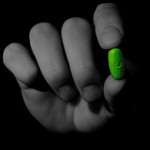
When it comes to curing abnormal anxiety you have to keep your head on a swivel; always on the lookout for a permanent solution to your problem.
How you do this will vary but an important part of healing, regardless of the method, is managing the physical symptoms of anxiety.
The reality is that it’s difficult to make progress when your body is under constant assault by chest pain, palpitations and other symptoms.
Anxiety symptoms breed terror and ferocious mental unrest making it hard to do anything much less get better.
I always tell people and firmly believe that the key to stopping anxiety is confronting anxious thoughts.
But how are you supposed to confront your thoughts when you can’t even be sure that you’re going to survive?
If you are consumed with fear or lost in rumination you will remain immobilized and held hostage by rotten ideas and aimless worry.
Okay, cool, so anxiety symptoms are bad. What can you do about it?
One of the most effective ways to calm the body during a bout of acute anxiety is through the use of fast acting anxiety medication.
Now I don’t want you to think that medications are a flawless solution because they are not. They are, however, a powerful tool that should not be ignored.
Especially because certain medications can bring relief within 30 minutes preventing a downward spiral into a world of false beliefs and perturbed navel-gazing.
Remember that anxiety medications can be taken on an as needed basis which does not require a lifelong commitment to big pharma.
And although medication represents only one part of the recovery process it should always be considered when making an honest effort to get better.
Here’s the menu:
Benzodiazepines: A Swift Kick to Bad Nerves
Perhaps the most powerful, and tricky, type of fast acting anxiety medications are known as benzodiazepines, or benzos for short. These medications relax the body by slowing nerve impulses.
They work well but have been linked to a high incidence of dependence and abuse; especially when they are used for more than 6 months.
This means that if you select a benzo you should exercise caution by working closely with your doctor to prevent physical dependence.
There’s also a tendency for these drugs to cause withdrawal symptoms if you stop using them abruptly. However, if benzos are used only as needed you’re less likely to develop problems with withdrawal.
For all their drawbacks though benzos do have an upside. They offer a rapid means of stopping acute anxiety symptoms which is both practical and reassuring. Even the act of carrying these babies in your pocket could ward off a panic attack.
That matters because when people get locked into long battles with anxiety they tend to develop negative thinking patterns that dog them for years.
Benzos are not a panacea but they can stop unnecessary suffering while you seek a long-term solution.
Examples of Benzodiazepines:
- Xanax (alprazolam)
- Klonipin (clonazepam)
- Valium (deazepam)
- Ativan (lorazepam)
- Halcion (triazolam)
Adrenaline Cork
Beta-blockers are common medications with a variety of uses; chief among them is the control of high blood pressure, chest pain and migraine headaches.
Beta-blockers help to block epinephrine and norepinephrine at adrenergic receptor sites which are primarily located in the heart.
Translation: This stuff slows down the heart. They also decrease sweating and tremor.
These medications have been used for some time as a kind of performance enhancer by musicians, public speakers, and others that may encounter stage fright.
Of course, these medications also come with a set of drawbacks. Beta blockers may cause diarrhea, stomach cramps, nausea, dizziness, cold hands, or vomiting. You may also experience rash, blurred vision or fatigue.
What’s nice about beta-blockers though is that they are not habit forming and effective at treating anxiety symptoms.
They can provide hours of relief and are safe for people that don’t have underlying health issues.
Examples of Beta-blockers:
- Inderal (propranolol)
- Sectral (acebutolol)
- Brevibloc (esmolol)
- Coreg (carvedilol)
- Tenormin (atenolol)
Antihistamines Are Not Just for Sniffles
When you think of antihistamines you probably think of stopping allergy or cold symptoms but they are also used to treat anxiety. They work by blocking histamine receptors in the central nervous system which produces a sedative effect.
Sedation may cause you to feel sleepy or develop a headache but otherwise these medications are well tolerated by most people.
One of the upsides to using antihistamines is that you can buy certain brands over the counter.
This can make anxiety management cheap and convenient. But I encourage you to not treat yourself with these medications long-term.
Besides, the more effective versions of these medications are prescription only and it’s always better to err on the side of caution and consult with a doctor about what you’re taking to manage your anxiety.
Examples of Antihistamines:
- Atarax/Vistaril (hydroxyzine)
- Benadryl (diphenhydramine)
It’s Not Just About Drugs
It’s important to understand that it is difficult to heal abnormal anxiety while experiencing intense physical symptoms. They make it hard for you to focus on solutions because they cause an OCD like obsession with well being.
However, through the use of fast acting anxiety medication you can calm your body and eventually your mind thereby limiting the amount of suffering that you have to endure before you get better.
Unfortunately, reducing your physical symptoms alone won’t be enough. Once you get your symptoms under control you still have to do the hard work of learning how to manage stress.
That means developing effective coping skills, taking care of your relationships, and addressing long-term problems that are contributing to your anxiety.
If I could do it all over again I would have at least tried a fast acting anxiety medication to deal with the intense symptoms that I experienced.
Maybe then I could have found my way out of the woods sooner.
What’s been your experience with these medications? Share your ideas with me in the comments section below.





I recently tried the beta blocker propranolol for a week due to constant anxiety and regular panic attacks. However I must be unknowingly asthmatic as it quickly made me breathless gasping for air and dizzy, which only made my anxiety worse. Its definitely worth trying though as its not habit forming and wont leave you with a physical dependence like an SSRI. Thanks for article!
Hey Chillielover, It may also be due to the fact that beta-blockers can lower blood pressure which could explain the slower respiration. Dizziness is a common side-effect of beta-blockers as well. I hope you don’t give up looking for something that works despite the set back.
Hi I have anxiety for a long time now, I have been taking propranolol for quite a while to. I seen my doctor on a fortnightly basis and been put forward to a therapist, I am on my 3rd session at the end of the month, my only trouble is that I had a horrible relationship breakdown two years ago and my parents split last year after 37 year and my mum will not get off my back, she has contributed her selfish ways over the last year, I have been stuck in a rut and do not no where to turn, im now in a new relationship and expecting my first child next july.
regards
A couple of years ago I had a terrible bout of anxiety for months, to the point that I felt it even the moment I woke up to the time I went to sleep. I could hardly function. The doctor tried several benzos and other medications. Nothing worked. All of them had unpleasant side effects, as well. Finally, they gave me olanzapine (same as Zyprexa), and it worked literally overnight. The only side effect is that it increased my appetite so I had to be careful with my eating. Anyway, this worked like a miracle drug, for my anxiety.
Great article! Beta blockers help me with night time panic attacks. I hardly experience anxiety these days but I still carry these little tables with me wherever I go. What helped me most was a regular chat with a psychologist, change of life style and regular exercise.
I was on sertraline for my anxiety, it worked for sleeping as well. For me, I’m not into drugs, but the anxiety thing was too much to handle so I went on the medication for two years and now i’m off of everything. It took me awhile to understand that theres two stages to a panic attack that i can prevent. First part was the bewilderment and fear, that first thought when a panic attack happens, then my mind adds to it by thinking of all the what ifs, like what if it doesn’t go away, what if i can’t find an exit to leave the room, but after catching myself doing that, i don’t ask what if anymore cuz it gives my anxiety fuel and the power to take over. I know i can control my anxiety with proper breathing and calming all my cells in my body, if that makes sense. I imagine my brain is a slab of butter on a hot summer day, in the sun. All the anxiety melting away and hearing the sounds of summer. I only think about that and imagine i’m there, in that summer time atmosphere. That way my anxious thoughts can’t get into my brain. I think of it as a reset, then the second part is reassurring myself that the roof won’t fall down on me, and if it does, i can get out, there are exits. These thoughts can spread like a wild fire so i have to keep them away from brain/thoughts. Usually after a minute i’m fine. Proud to say i’m off the meds but i do have benzos just in case, i haven’t had to use them in a year, but just the thought i have them is conforting for me. It can be done to be off all meds and anxiety is something I need to keep in check constantly.
I use Ativan as needed, and it can be a lifesaver. I am very careful not to over use it as I know tolerance and dependence can develop. .5 – 1 mg can knock down a pretty sever anxiety spell. It lasts several hours and can make you feel normal for a while. It is only a very temporary fix, but I think it can make room for real healing (thearpy and mindfulness) if it is used sparingly.
Interesting article here https://www.theguardian.com/society/2014/jan/05/scott-stossel-my-age-anxiety-extract
Paul your statement about Benzos is perfect. Anytime i freak out, taking an alprazolam cools your head. But it is sedative and and will put you out for several hours. Secondly these are recommended once a day for nights alone.
Talking about betablockers, these are the most dangerous class of drugs. You cant just pop in one at the time of anxiety and stop. It will lead to a rebound tachycardia. I had one and had to rush to the cardiologist. BBs make you light sensitive and creates rebound anxiety.
Chillie betablockers are contraindicated in asthmastics as it can lead to bronchospasm. The reason for gasping of air and dizziness is not asthma symptoms, it is a symptom of rebound tachycardia. When such a symptom occurs go to the ER immediately. It happened to me. The cardiologist put me on further betablockers, and i slowly weaned them off. It was a nightmare.
I just started on Lexapro. However, I’ve been reading “When Panic Attacks” by Dr. Burns, which I think has been quite helpful. His arguments are that anxiety is essentially thought based, and not genetically linked. It’s been making me not want to continue my SSRI, mostly because I’ve already noticed a difference just by trying to change my thoughts. I’ve been doing a daily thought log, which has shifted some of my thinking. However, I’m in grad school, so having time to work on this enough has been challenging, and I find myself slipping backwards some days, which is frustrating!
I have to agree with Jennifer’s comment below on betablockers: I took one once and it worked amazingly, but the rebound anxiety 6 hours later was no picnic.
I really appreciate how you highlighted coping skills. This is such a common therapy technique that it can get a bad rap because it is often not utilized well – sometimes clients are encouraged to just make “throw away” list.
I do believe in using anti-anxiety drugs when needed, and for as long as needed, so long as some type of behavioral change is needed, and especially if a person is having severe physical symptoms, such as muscle tension that is very painful and which interferes with daily life. Why? Because once pain gets programmed into a mind, it has a way of taking control. This can lead to fear avoidance and the things a person used to do innately becomes terrifying. This causes a sinking, continual cycle.
My reason for posting is this: many allopathic doctors do not even think to make an anxiety disorder for males. This can lead to doctors sending an allready nervous person for more anxiety-filled tests. It is good to eliminate any organic causes for illness, but in so many parts of the US, doctors do not associate strange physical symptoms as anxiety, especially in men.
Personally, I suffered a lot longer than I had to. I had severe physical symptoms, which twisted my entire torso and made me develop fear avoidance, which caused further anxiety and depression. I was in a great deal of pain day in and day out, and it made working on cognitive things almost impossible Doctors were reluctant to prescribe any type of benzo especially, but some were willing to put me on any SSRI or SNRI that happened to be the fancy that fiscal quarter. This resulted in them not working even if they could, because I could not calm my anxiety during the “waiting period”, so I never knew if any of them helped or not. Consequently, I could never get a medication that I could even keep in reserve, just in case.
.
Again, if you are male and suspect that–many tests and nothing found wrong -you are still suffering, it is best to seek out psychiatrist for any medication options. And even there you have to battle the stereotype that “men do not get anxiety”. Make sure that doctor has a background in anxiety disorders. The first psychiatrist I saw specialized in “adolence addiction”, so it was no little wonder why I didn’t get anything that could have brought me down from a month’s long panic attack.
This attitude may vary, depending where in the US you live, but in the Midwest, even in big metro areas, there is a definite mis-diagnosis of male anxiety cases. This is “Just snap out of it” territory.
I’ve been taking Zoloft and Xanax (when needed) for 16 years. In my expirence, Zoloft is not a cure and when you try to get off of it (which I have many times) all the anxiety comes back, all of it…sure Zoloft makes the anxiety go away when you take it regularly but that’s it. In order to actually get better you have to do it yourself without medication. Medications only numb you, they do not fix the problem at all. I’m down to a mere 50mg daily (originally on the maximum dose of 200mg) and no Xanax and I haven’t had a panic attack in months. I believe everyone can stop their anxiety if they do the work. Medications are definitely a “quick fix” and not a solution.
I’m looking to find a way to check out. I can not do this whole life thing anymore. I’d rather be gone than continue trying to get better. It will never happen.
Hi Lori,
I know things get can hard, but suicide is never the answer, and it certainly won’t just impact you. If you have a desire to harm yourself this is a sign that you need to reach out for help, not end your life. This urge is temporary and the issues underlying it can be treated.
Plus, many people that survive suicide attempts are happy to be alive afterward: read this.
Please reach out for help: 1 (800) 273-8255
National Suicide Prevention Lifeline
Hours: 24 hours, 7 days a week
Website: https://www.suicidepreventionlifeline.org
Is it safe to take Xanax for nervousness after Zantac and Zyrtec keep having reaction to something throws me into a panic attack, and I start staring at epi pen. Would rather take Xanax and pass out. Is it safe?
Hey Karen, I would always err on the side of caution and consult a doctor about medication related questions.
You might even ask a local pharmacists.
Hi my name is Alvina I am suffering from anxiety and depression for the past yr and 11mnths I have been on fluoxetine 40mg and xanax but while take the meds in November this yr I still get the palpitations and anxiety attacks what do I do or wat do I use cuz it give me the feeling that my heart gonna stop anytime
The fear of fear. One severe anxiety attack changed my whole life. I felt weak and shaky after the attack.
Very soon I started fearing the palpitations, trembling and dizziness that goes with an attack, and any stressful situation would trigger an attack.
I have been on medication for my entire life. Fortunately it is very effective, and I can live a 90% normal life.
One beta blocker in the mornings and Alzam on an as-needed basis.
I am currently taking Effexor 300mg and was previously taking Diazepam 5mg to not drink. Now I just had a baby and am on my own n the drama do not want to give me the diazepam any more. I didn’t take it while pregnant and m not breastfeeding. I’m just under a lot of pressure have been diagnosed with severe depression general anxiety and PTSD and was just given an antihistamine for anxiety which knocked me out. I’m so overwhelmed. I don’t want to drink and I just need something to take the edge off. Before this I had taken Diazepam for yrs with no incident, advice please!
I am a Vietnam Veteran that serviced as a special forces soldier and have tried everything for anxiety that are prescribed to the general population and they do very little for me and I need something that I can take that will work immediate not weeks from now, any suggestions?
Loved your article
The real cause of anxiety problems and all that are associated with it is BIG PHARMA COMPANIES, stock holders, owners, anyone that derives money from these billion dollar businesses. Take all those pills, medications,nnow think for a moment. Not one of then cure anything,bthey treat the symptoms only. This will cause you to be on them for life, unless you decide to take your life which many people attempt or do. Try and stop your medication and end up in the hospital. You are encouraged to never stop cold turkey. If conventional medicine cured problems that would mean Big Pharma would not have those BIG $$$$$$$ monthly, checks coming in. So back to treating the symptoms only. There are books that describe what medications do to you and how to taper off safely. Google and find them, Dr Peter Breggin is Great reading “Medication Madness.”
Search for alternative treatments that treat the cause (root) of problem(s) and not the symptoms. Mental illness, OCD, anxiety problems, some of these take 4-12 weeks before they really can treat the problem. What are you doing while waiting for those 4-12 weeks? Your suffering, greatly suffering and there is nothing Doctors can give you. Once the POISONIOUS medication kicks it it only reduces your symptoms by 40-60%, then while on medication you can have a relapse. How can USA not have best companies, best Doctors, best Medications that treat your problems. 💰💰💰💰💰💰💰💰💰💰. That is what money does,nit generates more money and more money. Everything is about money, there is no light at the end of tunnel. Sickening!
hi
I have tooth issues which nobody has pinpointed what ecactly it is. They are suspecting it may be cracked tooth which may not get visible in xrays.
worst thung us, this has unduced palpitations and pulsation around that toorh and also feel my heart beat. all my other results are normal.
I am hesitanr to rake anti anxiety medicine like xanthax as it seems tooth related but no dr is able ti pinpoint.
any suggestions?